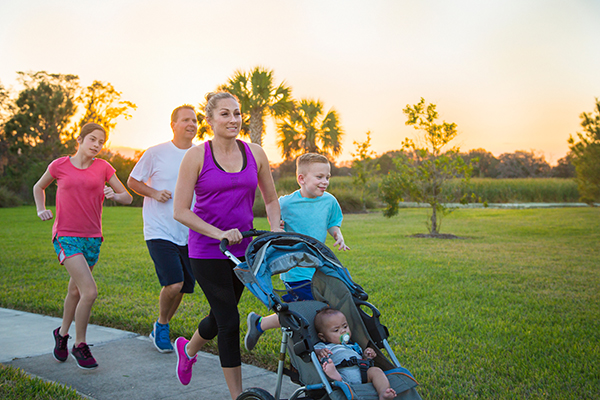
In a separate study published in Sleep Medicine, researchers associated poor sleep quality with impaired quality of life as some participants reported depression or anxiety.
You might be getting enough hours of sleep, but that doesn't necessarily mean you're getting the most restful type of sleep.
According to the National Sleep Foundation, most adults need somewhere between seven and nine hours of sleep at night – but a lot depends on what is happening during those hours.
Good-quality sleep ensures that you get the essential emotional, mental and physical benefits you need from your slumber.
Sleep quality goals
The following items provide an overview of sleep quality goals. You need to be familiar with these four items that are generally assessed to measure sleep quality.
It is important to note that there are some individual and age differences in these factors. For example, it's common to wake up more frequently during the night as we get older. As long as you return to sleep quickly, this won't hurt your sleep.
Sleep latency
This is a measurement of how long it takes you to fall asleep. Drifting off within 30 minutes or less after the time you go to bed suggests that the quality of your sleep is good.
Sleep waking
This measures how often you wake up during the night. Frequent wakefulness at night can disrupt your sleep cycle and reduce your sleep quality. Waking up once, or not at all, suggests that your sleep quality is good.
Wakefulness
This refers to how many minutes you spend during the night after you first go to sleep. People with good sleep quality have 20 minutes or less of wakefulness during the night.
Sleep efficiency
The amount of time you actually spend sleeping while in bed should ideally be 85 percent or more for optimal benefits.
Together, these four elements can help you assess the quality of your sleep. They contribute to an overall sense you have of your sleep being "satisfying" or not.
Improving your sleep quality can help ensure that your sleep cycles won't be interrupted, which in turn helps assure that you will wake up feeling energized.
Your sleep quality is considered poor if it takes you longer than 30 minutes to fall asleep; if you wake up during the night more than once; or if it takes you longer than 20 minutes to drift back asleep after waking up.
You're likely to feel tired the next day, even if you get the recommended number of sleep hours.
Sleep hygiene for good-quality sleep
Sleep hygiene refers to healthy habits, behaviors and environmental factors that can be adjusted to help you have a good night's sleep. Your body is ready to sleep when your circadian rhythm and your sleep drive line up.
Sleep drive signifies your sleep need, based on a buildup of a chemical called adenosine in the brain that accumulates while you are awake and is metabolized while you sleep. The accumulation of sleep drive makes you feel sleepy. (Related: Natural sleep aids: Enjoy a good night of sleep.)
Practice these healthy sleep hygiene habits to help you fall asleep more quickly, remain asleep throughout the night and feel refreshed in the morning.
Follow a consistent sleep-wake schedule
Going to bed and waking up at the same time each day can help you establish a healthy routine and sleep better each night. In order for this system to be effective, you should follow the same schedule on the weekends and during vacation.
Carefully time your naps
Napping after 3 p.m. can be disruptive to your sleep. Furthermore, nap duration is an important consideration. Napping for more than 30 minutes can lead to deep sleep that creates feelings of confusion and grogginess after waking that may last for hours. Shorter naps, on the other hand, make you feel refreshed without cognitive impairment.
Exercise daily and consistently
Physical activity during the day can help you feel more tired and ready for sleep in the evening. Exercising close to bedtime may cause arousals that make falling asleep more difficult, so morning to mid-afternoon will probably be the best time to exercise.
Avoid nicotine products
Cigarettes, chewing tobacco and other tobacco products that contain nicotine can interfere with healthy sleep. Researchers have documented sleep disturbances among active nicotine users, as well as those experiencing withdrawals from tobacco cessation.
Spend some time in the sunshine
Natural light and darkness guide the circadian rhythms that regulate your sleep cycle. Exposing yourself to sunshine during the day can help keep your circadian cycle properly aligned.
Abstain from caffeine late in the day
Caffeine is a stimulant that produces feelings of alertness that can last up to six hours. Consuming caffeinated foods and drinks in the morning or early afternoon may not affect your sleep, but these should be avoided in the late afternoon and evening.
Refrain from alcohol before bed
Alcoholic drinks can induce feelings of sleepiness that help you fall asleep more easily, but alcohol can also cause sleep fragmentation during the night which interferes with your sleep cycle. The effects of alcohol on sleep are largely dose-dependent – the more you drink, the greater the impact on your sleep quality.
Avoid heavy meals at night
If you feel hungry after dinner, opt for a light snack instead of a larger meal. The latter can make falling asleep difficult and disturb your sleep during the night.
Relax in the evening
Light stretching or yoga, reading and listening to music are activities that promote feelings of relaxation before bedtime. Avoid vigorous exercise and other arousing activities.
Limit your screen time
Cell phones, tablets, televisions and computers all emit blue light through their screens. This light is believed to suppress the production of melatonin, a sleep-inducing hormone your body releases in the evening. Research also suggests blue light can damage photoreceptors in the eyes.
Create a sleep-friendly bedroom
The ideal bedroom for sleeping should be dark, cool and quiet. Turn off cell phone alerts during the night. The optimal temperature for sleeping is thought to be between 66 and 70 degrees Fahrenheit, so adjust your bedroom's thermostat accordingly.
Get up if you can't sleep
Lying in bed during the night can negatively impact your sleep. If you have been awake for more than 20 minutes, get up and engage in a relaxing activity like reading or listening to music until you feel tired again.
Visit HealthScience.news for more stories like this.
Watch this video about stopping anxiety ruin your sleep.
This video is from the Daily Videos channel on Brighteon.com.
More related stories:
Supplementing with magnesium for better sleep.
3 Reasons why Americans suffer from sleep disorders.
Healthy habits that can improve your quality of life.
Sources include:
Please contact us for more information.






















